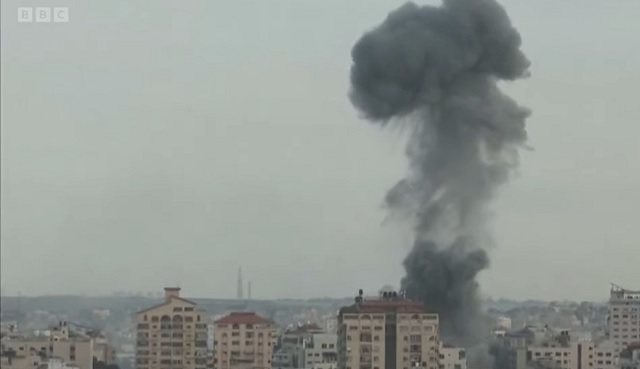Israel is going to win. But then what?
By Dr. Rich Swier

More than 700 Israelis and 400 Gazans have died since Hamas launched its surprise attack out of the Gaza Strip into southern Israel on Saturday. The terrorists retreated into Gaza with scores of military and civilian hostages. Israeli Prime Minister Benjamin Netanyahu has vowed mighty and merciless vengeance.
Now the Israeli military faces the terrifying challenge of a ground war inside Gaza to crush Hamas and rescue the hostages.
In the short term, the outcome of this disastrous war seems certain, at least if it does not spread beyond the borders of Israel and Palestine. Israel’s military will stomp on Gaza, kill the leaders of Hamas, and seal the borders to ensure that this humiliation will not be repeated. So, as Zev Farber, a columnist for The Times of Israel, observed, Netanyahu’s sabre-rattling falls flat. Everyone knows that Israel can and will defeat Hamas.
The larger question is what comes after “victory”?
It may seem laughable, but only last year an Israeli entrepreneur, Gershon Baskin, was dreaming of making Gaza the Singapore of the Middle East. Think about it for a moment. Into Singapore’s 734 square kilometres are crammed 5.6 million people. Yet its GDP per capita is higher than that of the United States. The Gaza Strip is 365 square kilometres with a population of 2.4 million. This makes it one of the most densely populated countries in the world – about the same as Singapore. There would be five-star hotels on the beach; a special economic zone employing thousands of Gazan workers, a joint Israeli-Palestinian maternity hospital on the border called “Birthing Together”…
Why not? There are two reasons.
First, Gaza is being throttled by Israel. Its borders are controlled; its ports are controlled; its water and electricity are controlled. It has no resources except for its people and they are starved of opportunities.
Second, Gaza is governed by fanatics who have vowed to destroy Israel, which explains the first reason. It’s a vicious circle. In 2005 Israel unilaterally pulled out and handed the keys to the Palestinian Authority. In 2006 the Gazans, to everyone’s dismay, elected Hamas. Despite reassuring noises, it quickly became clear that Hamas was more interested in destroying Israel than in the welfare of the people it governed. And this is why Israel will seek not just to defeat but eliminate Hamas.
But even if Israel is successful – and its “success” will be immensely costly, in terms of lives, of international prestige, and money – it cannot eliminate the foundations for the next war.
Gazan demography is Hamas’s most potent weapon. People aged between 0 to 14 are 42 percent of the population; people between 15 to 24 are 22 percent of the population. People over 65 are less than 3 percent. The median age is 18. By comparison, the median age in the United States is more than double – 38.5 years. The Gaza Strip is bursting with young unemployed young men. Youth unemployment is 40 percent – 34 percent for men.
Sealing a bottle full of young men with nothing to do except chew the cud of grievance and despair and listen to the violent raving of Islamist leaders is going to lead to another eruption of violence. In ten years’ time, after Gaza is rebuilt from the rubble left after the Israeli invasion, the bottle will explode again.
Israel has tried apartheid and repression and they do not work. What it needs is not more weapons but more creative diplomacy. As Farber wrote: “Israelis and Palestinians need to engage instead of disengage … the status quo of occupation on one side and terrorism on the other cannot, or at least should not, continue.”
I don’t know how many Israelis support Farber’s vision for the future, but it is fascinating to know that there are Israelis and Palestianians who believe that peace is possible:
“This involves Israel in many distinct steps, such as massive investment in Gaza and the West Bank, to bring Palestinian living conditions up to Jewish living conditions, creating a truly bilingual country with Palestinians fluent in Hebrew and knowledge of Jewish culture, and Jews fluent in Arabic and knowledgeable of Palestinian culture. It involves figuring out how to create quasi-autonomous regions that are part of one overarching federal government, with Israel as a Jewish state, but with Palestinian culture as an integral part of that state, with cultural representation and, of course, voting rights in the relevant regions.”
In the middle of atrocities and bloodshed this week, it’s hard to think about peace. But peace through creativity, compassion and compromise is the only way forward. Otherwise the false calm of apartheid will be punctuated by war after war after war.
AUTHOR
MICHAEL COOK
Michael Cook is editor of Mercator.
RELATED ARTICLES:
Pro-Hamas Mob Chants ‘Gas the Jews’ in Australia
Inside Iran’s influence operation | Semafor
After a shocking Hamas assault on Israel, both sides brace for the devastating fallout
Biden admin has no plans to freeze $6 billion they gave to Iran
RELATED VIDEOS: WAR IN ISRAEL: Special Guest former CIA Agent Clare Lopez
Understanding the Hamas War on Israel
EDITORS NOTE: This Mercator column is republished with permission. ©All rights reserved.

This article is courtesy of DrRichSwier.com, an online community of citizen journalists, academics, subject matter experts, and activists to express the principles of limited government and personal liberty to the public, to policy makers, and to political activists. Please visit DrRichSwier.com for more great content.

